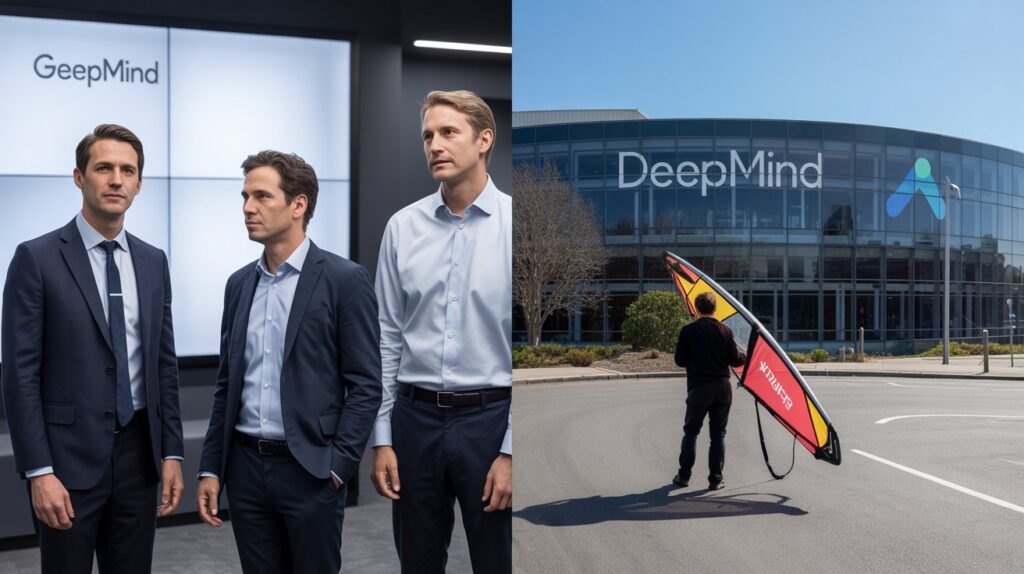
TL;DR
- OpenAI has officially lost its $3 billion acquisition bid for viral AI coding startup Windsurf, according to The Verge.
- Instead, Google DeepMind is hiring Windsurf’s CEO, Varun Mohan, co-founder Douglas Chen, and a portion of the top research team.
- Bloomberg reports Google will pay $2.4 billion for a nonexclusive license to Windsurf’s technology — without acquiring the startup outright.
- The remaining Windsurf team, led by interim CEO Jeff Wang, will continue operating independently.
OpenAI’s Acquisition Attempt Falls Apart
In a major twist in the AI arms race, OpenAI’s attempt to acquire Windsurf — the red-hot AI coding startup — has collapsed, according to The Verge.
Instead, Google DeepMind has executed a reverse-acquihire, bringing Windsurf’s top leaders and technologists into its fold while licensing key technology — but not acquiring the company. This deal structure appears designed to avoid regulatory scrutiny, a tactic increasingly used by major tech firms in the AI talent wars.
“We’re excited to welcome some top AI coding talent from Windsurf’s team to Google DeepMind to advance our work in agentic coding,” said Google spokesperson Chris Pappas in a statement to TechCrunch.
Deal Details and Strategic Implications
According to Bloomberg, Google is paying $2.4 billion to license Windsurf’s AI coding technology and bring its leadership team onboard — including CEO Varun Mohan and co-founder Douglas Chen.
Notably, Google is not taking equity in Windsurf and does not have operational control, making this a classic nonexclusive licensing deal. Windsurf remains free to license its tech elsewhere.
This marks Google’s latest strategic hiring play, following similar moves to secure Character.AI CEO Noam Shazeer and Mustafa Suleyman from rival firms.
“We are proud of what Windsurf has built… and excited to see it move forward with their world class team,” said Mohan and Chen in a joint statement to TechCrunch.
Windsurf Remains Independent — For Now
As of Friday, Jeff Wang, Windsurf’s head of business, has stepped up as interim CEO. According to his post on X, the startup’s 250-person team will remain largely intact and continue offering enterprise AI coding tools.
But questions loom over Windsurf’s long-term trajectory. Other AI firms that lost founding talent — including Scale AI and Inflection — faced significant slowdowns or pivots after high-profile departures.
Internal Conflict with Microsoft?
The Wall Street Journal previously reported that OpenAI’s attempt to acquire Windsurf created friction with Microsoft, its largest backer. Microsoft holds rights to all OpenAI intellectual property, and OpenAI reportedly did not want Windsurf’s tech to fall under this umbrella.
Sources close to the deal said the exclusivity window expired earlier Friday, as confirmed by Fortune, freeing Windsurf to entertain new offers — including Google’s.
The Data
| Key Development | Details |
| OpenAI Acquisition Status | Deal collapsed after exclusivity expired |
| Google’s Move | Reverse-acquihire + $2.4B tech license |
| Incoming Executives | Varun Mohan (CEO), Douglas Chen (co-founder), and top researchers |
| New Windsurf CEO | Jeff Wang (interim) |
| Windsurf’s ARR (as of April) | ~$100M (up from $40M earlier this year) |
| Remaining Team Size | ~250 employees |
| Tech Focus | AI coding tools for enterprise customers |
| Industry Comparison | Similar moves by Microsoft (Suleyman) and Meta (Scale AI deal) |
Market Impact and Industry Context
The move significantly strengthens Google DeepMind’s position in the AI coding space, especially as rivals like Anthropic and OpenAI push their own products — Claude Code and Codex, respectively.
With top talent from Windsurf now working on Google’s agentic coding initiatives, DeepMind gains strategic advantage in a segment increasingly critical for developer tools, enterprise adoption, and revenue generation.
For Windsurf, however, the road ahead may be rocky. Startups that lose founding talent often struggle to maintain their growth momentum or brand identity — a risk Windsurf will need to actively manage.





